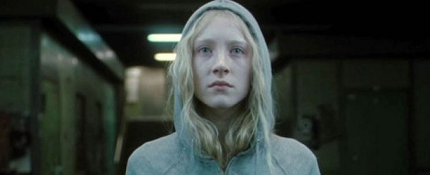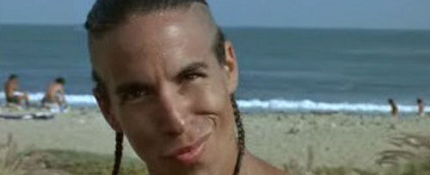 I wouldn't blame you for not recognizing the face to your left, notwithstanding the title of this post. Tommy Lee Jones wasn't particularly famous in his youth, making his way through guest spots on TV shows all through the 70s (Barnaby Jones, Baretta, Charlie's Angels) until a breakout performance in Coal Miner's Daughter put him on the map (I'm guessing; after all, I was only 4 years old at the time). Still, it was TV work through the 80s as well, though his performance in the epic (and star-studded) Lonesome Dove mini-series in 1989 made him a burgeoning star.
I wouldn't blame you for not recognizing the face to your left, notwithstanding the title of this post. Tommy Lee Jones wasn't particularly famous in his youth, making his way through guest spots on TV shows all through the 70s (Barnaby Jones, Baretta, Charlie's Angels) until a breakout performance in Coal Miner's Daughter put him on the map (I'm guessing; after all, I was only 4 years old at the time). Still, it was TV work through the 80s as well, though his performance in the epic (and star-studded) Lonesome Dove mini-series in 1989 made him a burgeoning star.Since then, Jones has been a fixture on movie screens, alternating between star turns (The Fugitive, Men in Black) and guest roles (Batman Forever, Natural Born Killers) in a wide variety of genres, playing an even wider array of types. Over the last 15 years, he's garnered a reputation as a modern-day version of an old school Western hero - tough as nails, a man of few words and strong actions. His dry, laconic way of speaking worked well in a straight action pic like The Fugitive and just as well in the black-humor tinged Men in Black series.
Despite the rep, the man is capable of diversity; witness his over- the-top performance in one of the only Steven Seagal films worthy of watching (Under Siege), and his turn in the horrific Batman sequel as evidence. In the Valley of Elah provides a much more compelling case, as well as one that ought to be remembered come awards season.
the-top performance in one of the only Steven Seagal films worthy of watching (Under Siege), and his turn in the horrific Batman sequel as evidence. In the Valley of Elah provides a much more compelling case, as well as one that ought to be remembered come awards season.
 the-top performance in one of the only Steven Seagal films worthy of watching (Under Siege), and his turn in the horrific Batman sequel as evidence. In the Valley of Elah provides a much more compelling case, as well as one that ought to be remembered come awards season.
the-top performance in one of the only Steven Seagal films worthy of watching (Under Siege), and his turn in the horrific Batman sequel as evidence. In the Valley of Elah provides a much more compelling case, as well as one that ought to be remembered come awards season.Jones stars as Hank Deerfield, a retired Vietnam veteran, husband to Susan Sarandon's Joan and father to two sons, each of who likewise joined the Armed Forces. The film opens with Jones getting a call stating that his formerly deployed-in-Iraq son (whose troop is now stateside) has gone AWOL in the States. As we later learn, Hank and Joan's first son was shot down while serving his country; with this knowledge in tow, Hank takes it upon himself to drive from Tennessee to New Mexico to find his youngest child.
 From there, the film is equal parts detective show and political commentary. "Inspired" by the actual story of Iraq war veteran Richard Davis and his father Lanny, writer/director Paul Haggis manages to be both subtle and blunt simultaneously in his observations and criticism of not just the current war (as most press surrounding this film will have you believe) but of the Armed Forces in general. The questions asked in the film are mostly ones that can't be spoken without spoiling the story, but suffice it to say that they focus on the psychological drama/trauma of being a soldier, the things that our country asks our soldiers to do, and the ramifications of those actions.
From there, the film is equal parts detective show and political commentary. "Inspired" by the actual story of Iraq war veteran Richard Davis and his father Lanny, writer/director Paul Haggis manages to be both subtle and blunt simultaneously in his observations and criticism of not just the current war (as most press surrounding this film will have you believe) but of the Armed Forces in general. The questions asked in the film are mostly ones that can't be spoken without spoiling the story, but suffice it to say that they focus on the psychological drama/trauma of being a soldier, the things that our country asks our soldiers to do, and the ramifications of those actions. By having Jones' character be a Vietnam veteran in the film (Davis was an MP), Haggis is able to put us in the shoes of someone who might be your stereotypical flag-waving patriot, right down to the detailed habits still stuck with the 50-something (shining shoes, neatly making his hotel bed, etc.). That said, a glaring error in the film is what is not spoken: namely, many of the things that are being painted as horrific actions done by Americans soldiers in Iraq are the same types of things that happened in Vietnam. Whereas many might use this film as ammunition against the Bush administration (his voice is heard in the background giving speeches on a few occasions), I saw it as a pointed finger at the military in general.
Though actors are often awarded for showy performances, it's often true that the best acting comes with what's not said, and that is entirely the case here. Both Jones and Sarandon (underused but still excellent, and surprise surprise to see Susan in an anti-war film) seem to say fewer words than the minutes they appear onscreen for. Charlize Theron, as a detective who gets a bit too close to the case, is given some of the meatier work, and she is terrific as well. Jason Patric (where ya been?), Josh Brolin, James Franco (in a bit part), That Guy Barry Corbin and a number of lesser-known actors fill out the impressive ensemble cast. (Kudos as well to the 55 year old Frances Fisher for playing a strip club - Kathy Bates and Diane Keaton, eat your hearts out.)
Despite a few Scooby-Doo moments in the solving of the case (no doubt embellished to a degree), the detective aspect of the film works, as Jones essentially makes both the local police (Theron included) and the military police look like amateurs. Whereas Haggis' Crash felt contrived with its connections at times, Elah rarely feels anything less than real, and powerful. It's a heartbreaking, depressing, political drama - surely not a popcorn film, but one that should definitely be seen.
Fletch's Film Rating:

"It's in the hole!"


























4 people have chosen wisely: on "Fletch's Film Review: In the Valley of Elah"
Honestly, there's pretty much no chance I'll ever see this. Excellent review though.
It's nice to know Fletch lives, btw. :)
Yeah, I figured Fletch played a part in the naming of your site.
"What'dja want under the bed?"
Love that guy - he's like a bad Clint Eastwood.
"I'm callin' the cops, this is fer the cops."
This movie is great! In a gut-wrenching sort of way.
good review. I love JOnes in his typical Jones self. I am looking forward to seeing him in No Country For Old Men.
Post a Comment